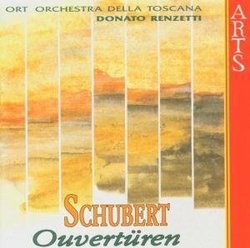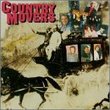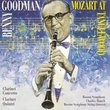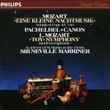| All Artists: Franz [Vienna] Schubert, Donato Renzetti, Toscana Orchestra Title: Schubert: Ouvertüren Members Wishing: 0 Total Copies: 0 Label: Arts Music Release Date: 10/1/1996 Genre: Classical Styles: Opera & Classical Vocal, Forms & Genres, Theatrical, Incidental & Program Music Number of Discs: 1 SwapaCD Credits: 1 UPC: 600554716824 |
Search - Franz [Vienna] Schubert, Donato Renzetti, Toscana Orchestra :: Schubert: Ouvertüren
 | Franz [Vienna] Schubert, Donato Renzetti, Toscana Orchestra Schubert: Ouvertüren Genre: Classical
|
Larger Image |
CD DetailsSimilar CDs
Similarly Requested CDs |
CD ReviewsSOMETHING ELSE UNFINISHED DAVID BRYSON | Glossop Derbyshire England | 03/06/2008 (4 out of 5 stars) "In fact this is a disc that I can recommend warmly for what it contains. What makes me just a little bit cross is what it does not contain. The playing time only runs to well under an hour, so there ought to have been an opportunity to include what is probably the best of Schubert's overtures, the number in E minor dating from 1819.
For me, Schubert's overtures have never had the distinctiveness of Beethoven's or Mozart's. This impression is no doubt due in part to my early experience of hearing them trundled out in routine performances as part of under-prepared broadcast concerts. All the same, none of the overtures bring us Schubert at his greatest. There are no great portentous tone-poems here like Leonora # 3 or Brahms's Tragic Overture, and no miracles in miniature like the overture to The Marriage of Figaro. Nor are there any `late' works among them, if a composer who died before his 32nd birthday can be even thought to have written late works. One, Der Teufel als Hydraulicus, bears the number 4 in Deutsch's catalogue of Schubert's compositions, which contains nearly 1000 entries, and the last is the overture to his opera Fierabras, D796. Schubert did not live to fulfil his potential in opera, but some of the overtures are freestanding works, notably the two overtures allegedly `in the Italian style'. It may in fact be the case that Schubert himself only gave this title to the C major composition, but nothing of any importance hangs on the question of how Italian either may be. To me, they are not all that unlike Weber's overtures (although nowhere near as good) and they have nothing like the panache of Rossini's nor do they sound much like those stylistically. The reason why I welcome this disc is that it gives me the opportunity to listen methodically to Schubert's overtures in fine performances and to gain a better understanding of where they fit in the development of this most divinely gifted of all composers. The Tuscan orchestra is not among the world's finest, but we are not dealing with the Great C Major symphony, and the sense of affection and understanding that players and conductor bring to the pieces is far more important. Listeners will likely turn to the liner-note for information and guidance as I did, but I must advise that you will have to work at that. It consists entirely of an essay on the music (which of course is what really matters) by the producer Gian Andrea Lodovici, but the English translation seems to have been done by a classmate of Hyman Kaplan. The material is probably sound rather than revelatory, but I turned for further help to Alfred Einstein's fine book on Schubert and I quickly spotted a certain amount of Signor Lodovici's phraseology in much more intelligible form, plus additional comment that advanced my grasp of the works rather more. The recordings date from 1990 and they seem admirable to me. This is certainly a disc that I recommend to Schubertians, but in fact I recommend it to music-lovers generally, so attractive and agreeable is the music and so winning are the performances. I could just have been doing with a little more of it." |

 Track Listings (8) - Disc #1
Track Listings (8) - Disc #1

